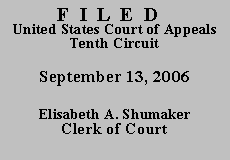

| BRIAN J. McGOLDRICK, |
|
A COA will issue "only if the applicant has made a substantial showing of the denial of a constitutional right." 28 U.S.C. 2253(c)(2). This standard requires "a demonstration that . . . includes showing that reasonable jurists could debate whether (or, for that matter, agree that) the petition should have been resolved in a different manner or that the issues presented were adequate to deserve encouragement to proceed further." Slack v. McDaniel, 529 U.S. 473, 484 (2000) (internal quotation marks omitted). In other words, the applicant must show that the district court's resolution of the constitutional claim was either "debatable or wrong." Id.
The Antiterrorism and Effective Death Penalty Act of 1996 (AEDPA), provides that when a claim has been adjudicated on the merits in state court, a federal court will grant habeas relief only when the applicant establishes that the state court decision was "contrary to, or involved an unreasonable application of, clearly established Federal law, as determined by the Supreme Court of the United States," or "was based on an unreasonable determination of the facts in light of the evidence presented in the State court proceeding." 28 U.S.C. § 2254(d)(1), (2).
Under the "contrary to" clause, we grant relief only if the state court arrives at a conclusion opposite to that reached by the Supreme Court on a question of law or if the state court decides a case differently than the [Supreme] Court has on a set of materially indistinguishable facts. Under the "unreasonable application" clause, relief is provided only if the state court identifies the correct governing legal principle from the Supreme Court's decisions but unreasonably applies that principle to the facts of the prisoner's case. Thus we may not issue a habeas writ simply because we conclude in our independent judgment that the relevant state-court decision applied clearly established federal law erroneously or incorrectly. Rather, that application must also be unreasonable.
Gipson v. Jordan, 376 F.3d 1193, 1196 (10th Cir. 2004) (internal quotation marks and citations omitted). "AEDPA's deferential treatment of state court decisions must be incorporated into our consideration of a habeas petitioner's request for COA" Dockins v. Hines, 374 F.3d 935, 938 (10th Cir. 2004).
We have carefully considered Mr. McGoldrick's pleadings and the record before us. No reasonable jurist could disagree with the district court's thorough and well-reasoned resolution of the issues. Therefore, we DENY a COA and DISMISS Mr. McGoldrick's appeal.
ENTERED FOR THE COURT
Harris L Hartz
Circuit Judge